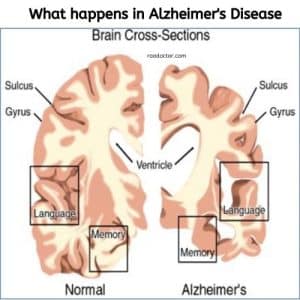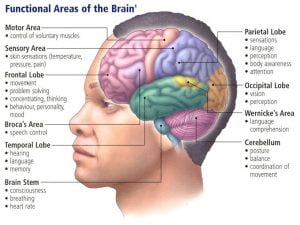10 Early Signs That You Are Heading Towards Dementia
How to Prevent Loss of Memory and live a Healthy Cognitive Life

Introduction
As the elderly population increases due to improving lifestyles, doctors are confronted with many cases of Memory loss. If you look at the picture just above the introduction, you can see what I mean- as we get older, this can be a situation. You will be downright happy to retain your memory and be proud of it, too! Nobody in his or her right mind would like to end up losing his or her memory. Just imagine, if one of your loved ones were to lose their memory, how would you feel about it.
Before we dig into the details of Dementia, I would like to tell you that I have converted this article into an audible one. So, you can listen to it and at the same time scroll down to read the text and see the pictures related to Dementia. Here we go-
Listen to this article-
Flashback-
Stressful life is another trigger for Memory Loss. I experienced this first hand when I visited my grandmother 25 years back. My grandmother- my mom’s mom- lived at our native place called Kumbla, a small town on the Kerala- Karnataka border in India. ” Mowma, kashi asa?” I asked her in Konkani, our mother tongue meaning’ how are you.’ Mowma is grandma in Konkani.
She just stared at me and replied ” Kon re tu? Kasa katir Ayla? Amtlya khampu kayi na.” Meaning ‘Who are you? Why you have come here? We do not have anything to be stolen for’.
My ‘ mowma’ had lost her memory. She was excellent till my uncle got married and left her. My uncle was the only son among six daughters of my grandparents. And he was her heart and soul.
After he left, she went into depression, which ultimately culminated in a total loss of memory. And this devastated all of those who considered her near and dear.
I was her favorite grandson. She did not recognize me. Imagine how I must have felt when she looked at me and asked me those questions!
Apart from memory loss, she had also lost her her spatial orientation- she had forgotten to use the toilet for her daily routine. She used to urinate and defecate whenever and wherever she was placed at that moment without any inhibitions!
This condition is called Alzheimer’s disease- a type of Dementia or memory loss.
What does it mean to Age Well?
In the past, we have heard people saying, ” The Older, the Wiser.” But, the present-day situation has changed- not every adult older adult is wise. In fact, in many cases, it’s just the opposite- old age has brought with it changes in forgetfulness in some older people. So much so that these people have been put up in Old Age Homes for caretaking.
To age well and keep our memory intact, we have to take care of our brain from as early as our adolescence. How to do it is the purpose of writing this article.
This article is very exhaustive, as we have to understand exactly how, why, and what about losing our memory. So, I have decided to break up this article into 3 parts to for you understand it better–
- Part 1-where we will discuss all things about the brain and the part responsible for our memory-The Seat Of Memory:
- Part 2-where we will discuss tests and investigations for Memory Loss;
- Part 3– where we will discuss how to prevent/treat memory loss.
For whom is this article can be useful?
This article has been written not only with older people in mind but also for the younger generations. Why the younger generation? Because the process of memory loss starts much before we reach old age.
Preventive measures are best taken from a young age. After a particular age, say in the 30s and 40s, changes start occurring in the brain, which may not be reversible. I will come to the prevention part as we go ahead.
Where do we stand now?
As the days go by, and as the longevity of many of us increases, we may have many more and more cases of Memory loss. Possibly surpassing almost other causes of old age diseases such as hypertension and diabetes.
Changes in cognition occur as we age. As we age, so does our brain. Just like in heart disease, changes start taking place in the brain naturally due to to-.
- Lack of blood supply due to the formation of plaques in the arteries[similar to that in the heart vessels];
- Rupture of blood vessels leading to what is commonly known as Stroke or Brain Hemorrhage.
Our brain is a complex structure. It is full of nerve cells and nerve fibers that connect with connectors called synapses. There are parts in the brain responsible for our memory- I will try to simplify it for better understanding.
{This article here will help you understand the science behind Memory Loss in a better way- link( inside the brain) }
Which part/ parts of the brain are involved in Memory loss?
Before we proceed ahead, let’s see how the brain looks, its different areas, and what function they carry out. Observe- your brain appears like a walnut kernel with the skull bones protecting it just like the outer shell of a walnut[see the picture below]-


Let’s now have a look at these two pictures in detail to understand the different parts of the brain and the seat of memory-
Fig.1


Here we are concerned mostly with areas marked Temporal Lobe and Frontal Lobe in the second picture. These two areas represent our mental abilities- the ability to remember, carry out intelligent tasks, etc. Injury to these areas like a head injury or hemorrhage will affect these areas causing loss of memory.
Are all the parts of the brain interconnected with each other?
All parts of the brain are directly connected. How? You may ask by nerve cells called Neurons that have branches called dendrites. Let’s say you have –
- Lost the smell-This sensation comes under the olfactory area- an area marked as the Parietal lobe in Fig 1. For example, if you close your eyes and are made to smell a crushed garlic pod, and you cannot tell what it is, then the memory stored in this area may have been lost. This can be a short term memory loss. This is exactly what happened to many of the COVID-19 patients-the Coronavirus had affected those parts of the brain-area no.2 and 8.
- Can’t remember how one person appears or looks– This can occur if an Occipital lobe area has been affected.
Could this Memory loss be a case of what we doctors call Senile Dementia, or could it be a Silent Stroke?
Many of us are familiar with words like Dementia, Alzheimer’s disease(AD), Parkinson’s disease (PD), etc. You may have also heard someone saying, ” He is demented- don’t listen to him.” Now, in this sentence, the word demented means foolish. But, in medical terms, Dementia means loss of Memory or Cognition. When it occurs in the elderly, we call it Senile Dementia.
As we age, the brain’s blood supply can get disrupted ( as mentioned above)in a small way. This can lead to the death of a few brain cells causing what we call a Silent Stroke. Here again, there can be changes in one’s memory, and the person may not remember recent events.
Now, What does this ‘Cognition’ mean?
In simple words, Cognition is the ability to remember and reproduce what we remember. A decline in cognition is called Memory Loss.
We shall stop here as I have come to the end of Part 1 of the Memory Loss Series. Hope you have understood the basic anatomy of the brain and its function. Kindly read and re-read this article because I shall be using many of the words used herein in my next article-especially the link I have provided on Inside the Brain.
You may also listen to this Podcast-Understanding The Brain to know more about the brain.
Before I leave, would you like to know whether you may be heading towards Dementia? Click on this link( 10 Early Signs Of Dementia).
In my next part, which will be published shortly, we will discuss-
- The causes of Memory loss
- Dementia and Alzheimer’s disease
- Tests and investigations for the above-mentioned illnesses.

